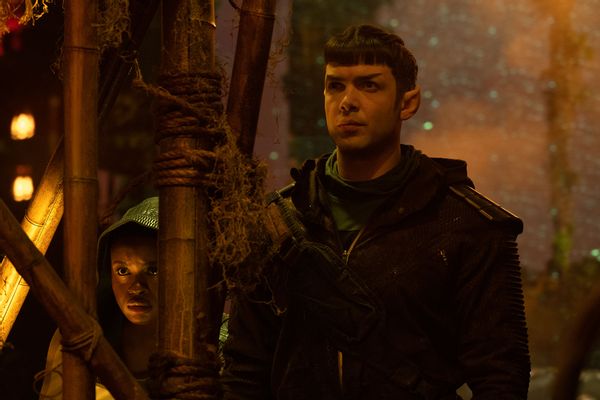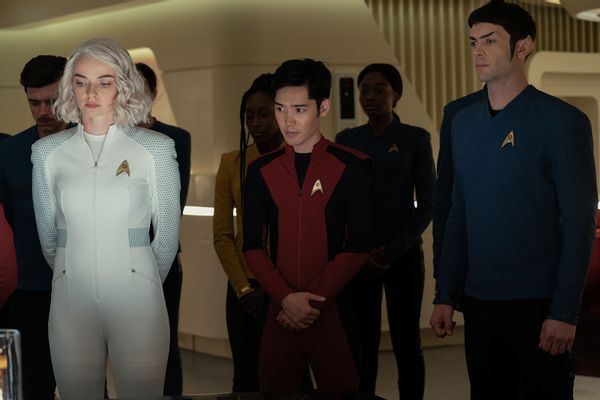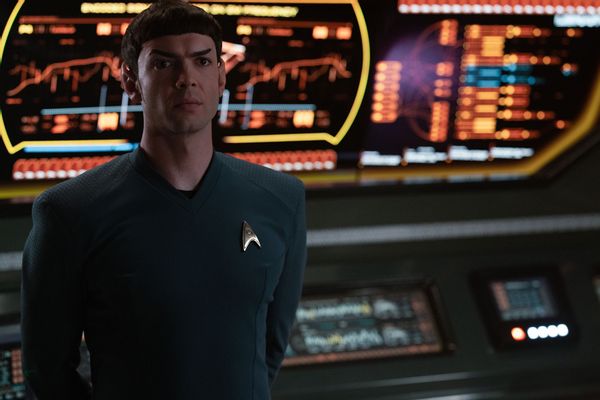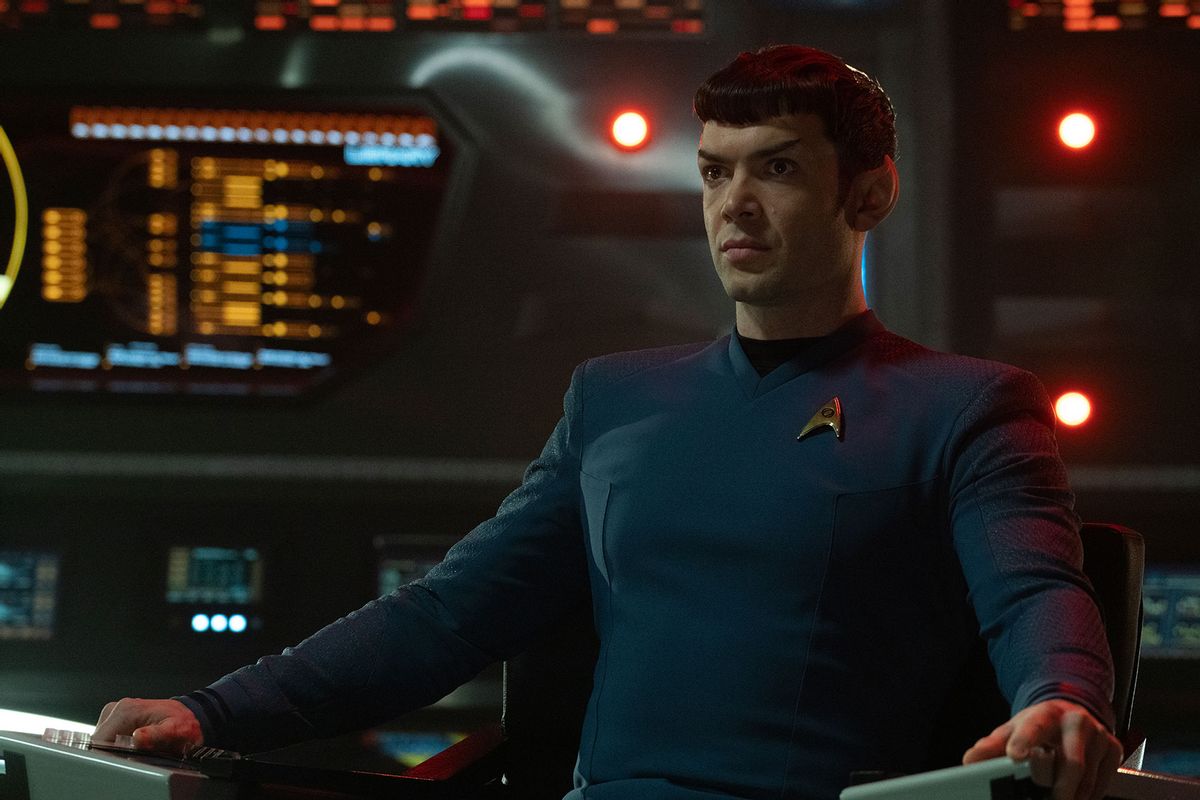Hijinks do not separate man from beast, as any cat owner, squirrel friend or chimpanzee observer knows far too well. They are, however, one of the many stark differentiators between humankind and Vulcans. Ethan Peck's version of Spock learns this early on in "Star Trek: Strange New Worlds" when he accidentally switches bodies with his betrothed T-Pring (Gia Sandhu) and duty calls, for each of them, before they can switch back.
"I do not like hijinks," T'Pring tells Spock.
"Neither do I," he replies, "but it appears that hijinks are the most logical course of action." He's proven to be correct when each awkwardly steps into the shoes of their other half and gains a better understanding of their daily lives. Everything works out – awkwardly, but well enough.
That episode, "Spock Amok," is an instructive prerequisite to the actions Spock undertakes in the second season premiere of "Strange New Worlds," "The Broken Circle." When Captain Christopher Pike (Anson Mount) leaves Spock in charge of the Enterprise for a few days while he heads off on a personal mission to save his Number One, Una Chin-Riley (Rebecca Romijn) from imprisonment, you knew his time in the captain's chair wouldn't be uneventful.
 Celia Rose Gooding as Uhura and Ethan Peck as Spock in "Star Trek: Strange New World" (Marni Grossman/Paramount+)
Celia Rose Gooding as Uhura and Ethan Peck as Spock in "Star Trek: Strange New World" (Marni Grossman/Paramount+)
Pike assumes it will be, since the ship is undergoing a mandatory inspection while docked at Starbase 1. What's the worst that could happen? How about this: La'An Noonien-Singh (Christina Chong), who has stepped away from Starfleet to pursue her own exploits, sends a time-sensitive distress signal from a sector of the universe the Federation avoids for fear of running afoul of the Klingons. This places Spock and the bridge crew in a predicament: they can follow orders to remain where they are, the logical choice, or defy them to save a friend, which could go wrong in all kinds of ways.
This Spock chooses hijinks.
"Star Trek: Strange New Worlds" maintains the closest fidelity to Gene Roddenberry's vision as it was established in the original series, both in terms of its mission of the week format and episodic considerations of sociocultural matters.
The United Federation of Planets' principles are always being tested, stretched and broken as the voyages of the U.S.S. Enterprise demonstrate. Nevertheless, even when the crew's best intentions end up being the wrong ones, they learn, adapt and grow.
Future Spock is a master of subtlety; Peck's is still learning how to harness the human clown goofing about in his DNA.
"Strange New Worlds" evolves the original model by emphasizing character over scenario, a luxury the 1960s show didn't have. Back then its now-iconic characters were entirely new. Now they're like family or, if not that, someone universal enough that even people who never connected to the tales of William Shatner's Captain Kirk get any references to him or Leonard Nimoy's Spock.
Because of this, Peck had the toughest needle to thread in picking up Spock's mantle. The second most difficult undertaking in that regard is shouldered by Celia Rose Gooding, who expands Nyota from the version Nichelle Nichols originated.
But as central to the Trek legend as Nichols is, Nimoy's Spock is on par with Shatner's Kirk as the personification of the franchise. In hindsight, J.J. Abrams lessened that burden for Zachary Quinto by setting his adventures in an alternate universe, the Kelvin timeline. He acquitted himself well enough.
Peck is the third actor to take on the role and the one who's spent the second longest amount of time in Spock's skin. His portrayal holds the challenge of plausibly maturing Spock in a way that connects the character's past to who he eventually becomes – as in, the Starfleet officer we already know. Therein rests the delight in what he brings to "Strange New Worlds," in that he's a half-human, half-Vulcan figuring out the balance of who he is and who he strives to be.
 Jess Bush as Nurse Chapel, Andre Dae Kim as Chief Kyle, and Ethan Peck as Spock in "Star Trek: Strange New World" (Marni Grossman/Paramount+)
Jess Bush as Nurse Chapel, Andre Dae Kim as Chief Kyle, and Ethan Peck as Spock in "Star Trek: Strange New World" (Marni Grossman/Paramount+)
Season 1 of "Strange New Worlds" is a trip through destiny – Pike's specifically. In the original series, Pike was introduced as a disfigured character kept alive inside by a boxy apparatus through which he could communicate with a blinking light. In this one he's a silver-haired Space Zaddy who cooks for his crew and commands from a place of mutual respect and understanding. During a mission undertaken on "Star Trek: Discovery" Pike is made aware of this terrible fate that awaits him. It continues to haunt him in this series.
Through a glimpse at a another possible fate that his future self presents to him, Pike is made to realize that what awaits him has to happen. If he prevents it, not only will it rip apart the Federation, it will kill its best chance at attaining peace with its Romulan adversaries. Which is Spock.
Season 2 widens its lens to build the case as to why that will be by focusing initially on Spock before diving deeper into other figures and their backgrounds, with a connecting thematic refrain that one's legacy should not necessarily determine one's prospects. (A newly introduced Starfleet officer named Pelia, played by Carol Kane, is a mirthful reminder of that for reasons best discovered by watching.)
She and others point out, in a complimentary way, that Spock is not like any other Vulcans they've encountered. He still follows logic above all else while understanding that occasionally doing what's right and best for the galaxy, and his fellow crewmembers, requires going against logic.
"Hijinks are the most logical course of action."
Venturing deep into his self-realization journey allows us a peek into how Nimoy's half-Vulcan mastered the art of dry-to-nearly-invisible humor and brainy sarcasm without breaking his deadpan expression or violating who we expect Spock to be. Future Spock is a master of subtlety; Peck's is a superbly capable leader who's still learning how to harness the human clown goofing about in his DNA.
His Spock's story is one of becoming which, like the premiere's mission, presents many opportunities to lurch sideways. This is why when "Star Trek: Discovery" announced its intention to bring Spock into the storyline, I was not hopeful. And I don't think I was alone in that feeling. Not initially anyway.
 Ethan Peck as Spock in "Star Trek: Strange New World" (Marni Grossman/Paramount+)
Ethan Peck as Spock in "Star Trek: Strange New World" (Marni Grossman/Paramount+)
Spock's essential prominence in the "Star Trek" universe is one of those traits that can be equally beloved and exhausting; there is no lazier way to buy the fandom's affection than injecting him into a plot. In fairness, that was an inevitability in "Discovery." Its main character, Michael Burnham, is Spock's adopted sibling.
But Peck defied those assumptions by building the character from the text instead of following prior depictions. The resulting Spock is plausibly more emotional than his future self is while allowing his devotion to logic to play on the borders of comedy.
"Strange New Worlds" directors accentuate this whenever it makes sense; even in the gloomiest junctures can be somewhat softened by Spock's eyebrow dancing into its quizzical arch.
Want a daily wrap-up of all the news and commentary Salon has to offer? Subscribe to our morning newsletter, Crash Course.
There is a fear these new episodes may over-index on that charming quirk. It is prominent in the first two episodes, and when it pops up in the second episode its usage is a bit too cute for the moment.
But in the premiere, when the crew asks for his Warp catchphrase, explaining that it announces what kind of commander he is – Pike's is "Hit it," for example, and Burnham's is "Let's fly" – Spock's best at a moment's notice is also totally in character. "I would like the ship to go," he commands, cocking that eyebrow before adding, "Now."
Then, when they get to the mission at their destination, hijinks ensue. This time they are terrifying and bring the Federation to the precipice of war.
With Spock at the helm, there is never a time when the audience is made to feel that the situation won't work out, and that's true even when a couple of characters flirt with death. "Strange New Worlds" proved its willingness to off series regulars in the first round of episodes, so the possibility of that happening was very real. So too is Peck's connection with his human side's eruption of fear, panic and sorrow.
Spock dials these back in upcoming episodes, both earning and boosting his comedy side. As a character tells another, Vulcans convey their true feelings not through words but in the way they comport themselves. You have to watch them closely to comprehend the nuances of their expression. Those who didn't get that from Nimoy's performance may gain a better understanding by spending time with Peck's Spock, which is one of the sweeter assignments a viewer can give themselves.
Season 2 of "Star Trek: Strange New Worlds" premieres Thursday, June 15 on Paramount+. New episodes debut on Thursdays.
Read more
about the Trek universe



Shares